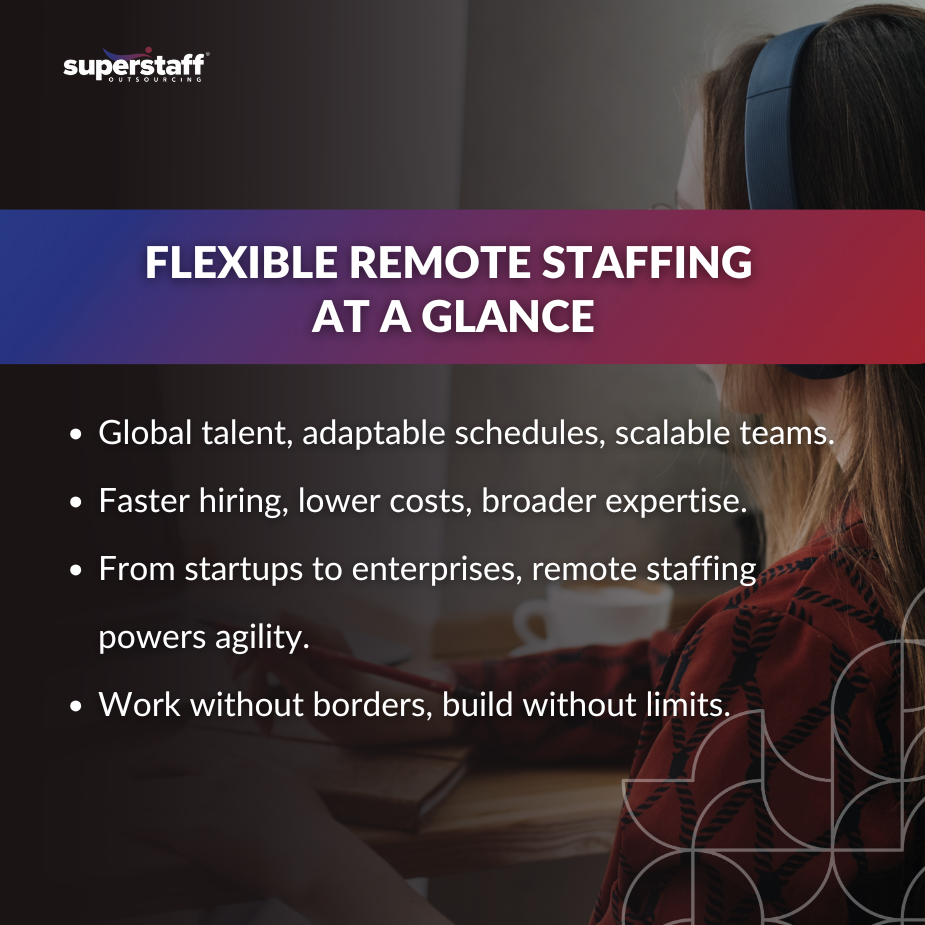
Business leaders across industries are rethinking how they manage their workforce. Instead of sticking to rigid in-house hiring, more companies are exploring flexible remote staffing as a way to stay efficient, reduce costs, and scale operations quickly. This approach gives businesses the freedom to bring in skilled professionals when needed without long-term hiring risks. With better tools and platforms available, flexible remote staffing has become a reliable solution for both small businesses and large enterprises.

Why Businesses Choose Flexible Remote Staffing
Flexible remote staffing provides organizations with access to specialized talent while keeping costs under control. It also helps teams adapt quickly to market changes. Below are some of the key reasons why businesses prefer this model.
1. Lower Costs Without Sacrificing Quality
Companies can save on expenses such as office space, utilities, and equipment. With flexible remote staffing, businesses can access professionals who deliver the same quality of work as in-house employees but at a reduced cost.
2. Access to Global Talent
Hiring is no longer limited by geography. Flexible remote staffing allows companies to connect with experts across countries, making it easier to find the right person for each role.
3. Faster Hiring and Onboarding
Traditional hiring can take months. With flexible remote staffing, companies can fill roles quickly, ensuring projects continue without delays.
4. Scalability and Adaptability
The workforce needs to change based on business growth and seasonal demands. Flexible remote staffing makes it easier to expand or reduce teams depending on requirements.
5. Stronger Productivity and Focus
When companies use flexible remote staffing, they can assign specialized tasks to professionals while internal teams focus on core operations. This division of work increases efficiency across the organization.
How Flexible Remote Staffing Works in Practice
This staffing model is simple but effective. By working with the right partners and platforms, companies can manage a workforce without boundaries.
1. Use of Cloud-Based Platforms
Many organizations now use cloud-based remote staffing systems that simplify communication, scheduling, and file sharing. These platforms make it easier to track performance and manage workflows.
2. Customized Hiring Solutions
Flexible remote staffing allows businesses to find exactly the type of professional they need. Companies can hire full-time, part-time, or project-based workers depending on their goals.
3. Support Across Time Zones
Global teams can provide 24/7 coverage for customer support, IT, or back-office functions. Flexible remote staffing ensures that work continues even outside normal business hours.
4. Outsourcing to the Philippines
One of the most popular options is to outsource to the Philippines, where companies can find skilled professionals in customer service, IT, finance, and more. Flexible remote staffing in this region provides both cost efficiency and high-quality results.
5. Cloud-Based Flexible Remote Staffing for Global Teams
With cloud-based, flexible remote staffing for global teams, companies can coordinate projects across continents. This creates a smoother workflow and helps businesses maintain consistent service worldwide.
Industries Benefiting from Flexible Remote Staffing
Flexible remote staffing is not limited to one field. Many industries are using it to improve operations.
1. E-commerce and Retail
Companies can hire remote staff to handle customer support, order processing, and logistics management.
2. Healthcare Services
Flexible remote staffing supports medical offices through billing, scheduling, and administrative roles.
3. Finance and Accounting
Global accounting teams can assist with tax preparation, bookkeeping, and reporting.
4. Technology and IT Support
Cloud-based remote staffing is useful for software development, cybersecurity, and system monitoring.
5. Marketing and Creative Services
Businesses use flexible remote staffing to hire digital marketers, content writers, and designers on-demand.
Key Advantages for Global Companies
Flexible remote staffing allows companies to operate on a wider scale.
1. Faster Expansion
Businesses can enter new markets without worrying about setting up physical offices.
2. Consistent Service Delivery
Cloud-based remote staffing tools allow companies to monitor progress and maintain consistent service levels.
3. Reduced Employee Turnover
Staffing flexibility lowers the pressure of permanent hiring, reducing turnover rates.
4. Focus on Core Growth
With flexible remote staffing, internal teams can focus on growth strategies while remote staff handle routine tasks.
5. Stronger Risk Management
Businesses avoid financial risks tied to permanent contracts by using short-term or project-based staffing.
Steps to Build a Strong Remote Team
Companies that succeed with flexible remote staffing follow practical steps.
1. Define Clear Roles
Each role should have clear expectations to ensure productivity.
2. Choose the Right Partner
Outsourcing to the Philippines or other talent-rich countries helps companies find skilled professionals at reasonable costs.
3. Use Secure Cloud-Based Tools
Data protection is critical. Cloud-based remote staffing platforms with security features keep business information safe.
4. Provide Regular Communication
Daily check-ins, weekly updates, and clear feedback help remote staff stay aligned with company goals.
5. Measure Performance Consistently
Tracking performance ensures that staffing goals are met and adjusted when necessary.
Flexible Remote Staffing as a Long-Term Strategy
Flexible remote staffing is no longer just a temporary fix. It has become a long-term strategy for businesses aiming for sustainable growth.
1. Future-Proof Workforce
Companies can adjust to changing markets with ease by keeping staffing flexible.
2. Stronger Collaboration
Cloud-based flexible remote staffing for global teams encourages cooperation across countries and cultures.
3. Better Employee Satisfaction
Remote staffing provides work-life balance, leading to higher employee satisfaction and retention.
4. Scalability Across Borders
Businesses can expand globally without heavy infrastructure investments.
5. Strong Competitive Edge
Companies that adopt flexible remote staffing remain competitive by staying efficient and adaptable.
Flexible Remote Staffing Builds Sustainable Growth
Flexible remote staffing has become a powerful tool for businesses that want to scale smartly, reduce costs, and build reliable global teams. By using cloud-based remote staffing tools and outsourcing to the Philippines, organizations can gain access to top talent while maintaining efficiency.
SuperStaff offers flexible remote staffing solutions tailored to the unique needs of each company. With expertise in building global teams, SuperStaff helps businesses stay competitive while focusing on long-term growth. Whether you need short-term support or ongoing staffing, SuperStaff provides the resources to keep your business moving forward.
Contact us now to discover how SuperStaff can help you build a strong, scalable, and efficient remote team.






